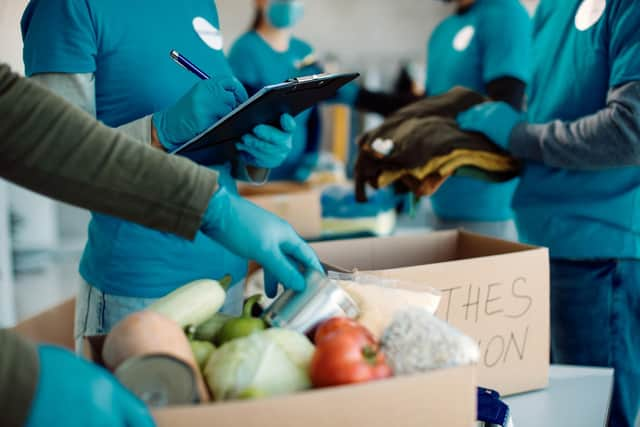Soaring demand for Mid Sussex food banks highlighted by new Trussell Trust figures amid cost of living crisis
and live on Freeview channel 276
The charity says it’s witnessing an accelerating crisis across the UK as the need for emergency food dramatically increased in the past six months. This follows the £20-a-week cut to Universal Credit and the soaring rise in living costs that people are facing.
New figures released today reveal food banks in the Trussell Trust’s network provided more than 2.1 million parcels to people facing financial hardship across the country, from April 1 2021 to March 31 2022. This represents a 14 per cent increase compared to the same period in 2019/20 – before the pandemic – as more and more people are unable to afford the absolute essentials that we all need to eat, stay warm, dry and clean. This is the first time food banks in the Trussell Trust’s network have provided more than 2 million parcels, outside of 2020/21, at the height of the pandemic.
Advertisement
Hide AdAdvertisement
Hide AdAlarmingly, more than 830,000 parcels were provided for children, representing a 15 per cent increase from 2019/20 when 720,000 were provided.


In Mid Sussex food banks provided a total of 6,782 parcels in 2021/22, of which 3,259 were to children.
In 2020-21 demand peaked with 7,753 parcels being distributed, with 3,867 of those going to children.
This compares to 4,544 given out in 2019/2020, before the pandemic struck. In that year, 2,095 parcels were given to children.
Advertisement
Hide AdAdvertisement
Hide AdAnalysis by the JPIMedia data team shows that in 2020/21 Mid Sussex distributed 4,458 parcels per 100,000 people and was ranked 17th in the South East.
But the difference between the figures in 2019/20 before the pandemic, and 2021/22 shows a shocking 49 per cent increase in demand.
The Trussell Trust says its food banks managers are now warning of an accelerating crisis across the UK following the cut to Universal Credit, as the cost of living continues to soar.
As inflation continues to increase and rising bills are putting pressure on families across the country, the Trussell Trust says its network expects need for emergency food to rise further still, over the coming months and beyond. One food bank manager said: “The people who come in are telling me they’re scared. People are beside themselves about what the next six months will bring.”
Advertisement
Hide AdAdvertisement
Hide AdEven though one in three people on Universal Credit are already skipping meals, the charity says the UK government is still choosing not to protect people already struggling to make ends meet.
A Trussell Trust spokesman said: "The UK government has failed to create any security for people on the lowest incomes, allowing the value of social security to fall dramatically in real terms while prices rise, the charity warns. In October the Chancellor removed £20 a week from low-income families across the country, the largest cut to welfare since the Second World War. And in his Spring Statement he rejected calls for benefits to be brought in line with the current rate of inflation to better reflect the true cost of living, the charity highlights. This is on top of a five-year freeze on benefits rates which means these payments are worth 11% less than they were a decade ago.
"With the energy price cap rise just starting to bite, the charity says for most people at risk from financial hardship – who cannot work or work longer hours due to disability, caring responsibilities or mental health issues – there is very little protection ahead. Food bank staff and volunteers will always do all they can to help people in their communities, they do this every day - but they cannot and should not be picking up the pieces of government inaction, particularly with a crisis of this scale."
Emma Revie, chief executive of the Trussell Trust, said: “People are telling us they’re skipping meals so they can feed their children. That they are turning off essential appliances so they can afford internet access for their kids to do their homework.
Advertisement
Hide AdAdvertisement
Hide Ad“How can this be right in a society like ours? And yet food banks in our network tell us this is only set to get worse as their communities are pushed deeper into financial hardship. No one’s income should fall so dangerously low that they cannot afford to stay fed, warm and dry.
“There is still time for the UK government to do the right thing. We are calling on the UK government to bring benefits in line with the true cost of living. As an urgent first step benefits should be increased by at least 7 per cent, keeping pace with increases in the cost of living. In the longer term, we need the government to introduce a commitment in the benefits system to ensure that everyone has enough money in their pockets to be prevented from falling into destitution.
“By failing to make benefits payments realistic for the times we face, the government now risks turning the cost of living crisis into a national emergency.”
A Government spokesperson said: “We recognise the pressures on the cost of living and we are doing what we can to help, including spending £22 billion across the next financial year to support people with energy bills and cut fuel duty.
Advertisement
Hide AdAdvertisement
Hide Ad“For the hardest hit, we’re putting an average of £1,000 more per year into the pockets of working families on Universal Credit, have also boosted the minimum wage by more than £1,000 a year for full-time workers and our Household Support Fund is there to help with the cost of everyday essentials.”